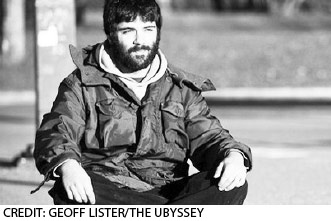Student spends Christmas experiencing homelessness

VANCOUVER (CUP) — While most students were enjoying hot meals and clean clothes courtesy of their parents, Nima Farzaneh was sleeping on the streets of Vancouver.
A University of British Columbia student working on his second bachelor's degree, Farzaneh decided to voluntarily spend a week homeless.
"I was actually taking the bus to UBC (when) this idea just popped into my head," said Farzaneh. "We're really grateful for everything that we have, and with Christmas coming up, I thought that it's the most important time for people to be with their families.
"(I thought) maybe I should try it for a week, maybe I should give up my Christmas dinner, maybe I should give up my birthday — my birthday's on the 28th of December — just to see what people go through," he said. "Maybe that way I would personally appreciate things more and maybe I could share my experience with others."
Armed only with a sleeping bag and the clothes on his back, Farzaneh depended on the kindness of strangers in order to get by, and spent much of his time getting to know the people who call the streets of Vancouver their home.
"They treated me very well. They treated me as part of the community. That was actually one of the things that I was always worried about, they may think a newcomer is coming in and who is this guy and they may give me a hard time," he said.
"A lot of the times, when I'd see someone panhandling or even doing drugs, like smoking crack in an alley, I would ask them if it was okay for me to sit next to them, and I've never been rejected when it came to that.
"I brought myself a pillow and a blanket, and any time they said it was okay, I would throw my pillow on the pavement, sit on the pillow and put my blanket around me and ... just listen."
Farzaneh recalled one man he met at a 24-hour coffee shop on Hastings St.
"When I was there (at the coffee shop) it was a bit cold, so some of the homeless people would come in and warm up."
One person sat down with him and spoke for two hours.
"He was crying, saying that his heroin addiction has caused him to depart his entire family," said Farzaneh. "There was such a great big distance between them that he created a separation that he was ashamed of.
"He said that about two or three years ago his brother passed away, and he did not go to the funeral and this is where he started sobbing again, because he wanted to go, but he was too ashamed to go."
Farzaneh thinks that if more people simply had more conversations and interactions with those who are homeless then many of the stigmas could be eliminated.
"A lot of the problems that people say have to do with homelessness and impoverished people is that they're lazy and they're all addicted to drugs and they could get jobs if they wanted to, but they choose not to and a lot of them are mentally ill. "(But) I think that is actually true across any kind of income level or any kind of ... there are very wealthy people who are addicted to drugs, but they're not on the streets.
"Rich people are lazy and poor people are lazy. There are liars, cheaters, criminals all across the spectrum."
Farzaneh, who took 120 pages of notes during his week on the streets, is now planning on sharing them on his blog, as well as having them translated into Farsi and French.
"My philosophy is that in order to understand other people we sometimes have to be empathetic and put ourselves in their shoes, and if we can't mentally put ourselves in their shoes, then we should physically put ourselves in their shoes."













